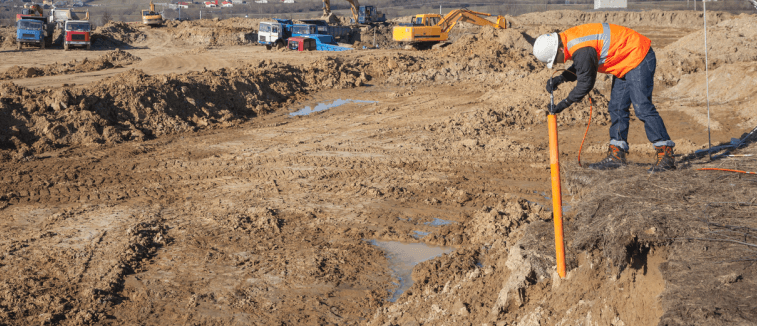Fascination About Geotheta
Geotheta for Dummies
Table of ContentsSome Known Factual Statements About Geotheta Geotheta - QuestionsThe 2-Minute Rule for GeothetaHow Geotheta can Save You Time, Stress, and Money.What Does Geotheta Do?

They conduct website examinations, collect examples, carry out lab tests, and assess information to review the suitability of the ground for building and construction projects - Consulting Engineers. Based upon their findings, geotechnical designers offer referrals for structure style, slope security, keeping structures, and mitigation of geotechnical dangers. They team up with various other professionals, such as architects, structural designers, and construction groups, to guarantee that geotechnical factors to consider are integrated right into the general task design and execution
By assessing the habits and properties of soil and rock, they can determine potential geotechnical risks such as landslides, dirt settlement, or slope instability. Their competence helps protect against failings or mishaps that might endanger lives and residential or commercial property. Below are some detailed obligations and responsibilities of a geotechnical designer: Site Examination: Geotechnical designers conduct website examinations to gather data on subsurface conditions.
They interpret the information to comprehend the homes and habits of the soil and rock, including their toughness, permeability, compaction characteristics, and groundwater problems. Geotechnical Analysis and Layout: Geotechnical designers analyze the information collected throughout site examinations to examine the security and suitability of the site for building tasks. They do geotechnical calculations and modeling to review variables such as birthing capability, negotiation, incline stability, lateral earth stress, and groundwater flow.
The Definitive Guide for Geotheta
Foundation Design: Geotechnical designers play a crucial role in making structures that can securely support the desired framework. They examine the soil conditions and lots demands to determine the proper foundation kind, such as shallow structures (e.g., footings), deep structures (e.g (https://anotepad.com/note/read/ew8kqmw7)., stacks), or specialized techniques like dirt renovation. They take into consideration variables such as negotiation limitations, bearing capacity, and soil-structure communication to create ideal foundation designs
They assess construction plans, display site activities, and conduct area assessments to validate that the design referrals are followed. If unanticipated geotechnical concerns emerge, they examine the circumstance and provide recommendations for removal or modifications to the design. Threat Evaluation and Mitigation: Geotechnical designers evaluate geotechnical hazards and threats connected with the job website, such as landslides, liquefaction, or dirt erosion.

Collaboration and Interaction: Geotechnical engineers function carefully with other specialists involved in a project, visit homepage such as designers, architectural engineers, and construction groups. Efficient communication and cooperation are necessary to incorporate geotechnical considerations into the total job design and building process. Geotechnical designers provide technological know-how, answer questions, and make certain that geotechnical needs are satisfied.
All About Geotheta
Below are some types of geotechnical engineers: Foundation Engineer: Structure designers concentrate on designing and examining structures for frameworks. They assess the dirt conditions, load demands, and site features to determine the most proper structure kind and layout, such as shallow foundations, deep structures, or specialized strategies like pile foundations.
They evaluate the factors influencing slope stability, such as soil properties, groundwater conditions, and slope geometry, and develop techniques to stop slope failures and mitigate risks. Earthquake Designer: Quake designers concentrate on analyzing and designing frameworks to withstand seismic forces. They assess the seismic threat of a website, review soil liquefaction possibility, and create seismic design standards to ensure the security and durability of structures throughout earthquakes.
They carry out field testing, gather samples, and analyze the collected information to define the soil buildings, geologic developments, and groundwater conditions at a website. Geotechnical Instrumentation Designer: Geotechnical instrumentation engineers focus on surveillance and determining the habits of soil, rock, and frameworks. They set up and preserve instrumentation systems that monitor variables such as soil settlement, groundwater degrees, slope activities, and structural displacements to assess efficiency and supply early warnings of prospective problems.
The smart Trick of Geotheta That Nobody is Discussing
They conduct examinations such as triaxial examinations, combination examinations, direct shear tests, and leaks in the structure tests to gather information for geotechnical analysis and design. Geosynthetics Designer: Geosynthetics engineers concentrate on the design and application of geosynthetic products, such as geotextiles, geogrids, and geomembranes. They use these materials to boost soil stability, strengthen slopes, supply water drainage services, and control erosion.
They have a tendency to be investigatory individuals, which implies they're intellectual, reflective, and inquisitive. They wonder, methodical, reasonable, logical, and logical. Some of them are likewise social, suggesting they're kind, charitable, participating, patient, caring, practical, understanding, sensible, and pleasant. Does this audio like you? Take our free profession test to discover if geotechnical engineer is among your top job suits.
In the office environment, geotechnical designers use specialized software program tools to carry out calculations, develop designs, and assess information. They prepare records, evaluation project specifications, connect with clients and employee, and coordinate task activities. The office setup supplies a conducive setting for research study, analysis, and cooperation with various other professionals associated with the job.
Geotheta Can Be Fun For Anyone
They frequently see project websites to perform site examinations, evaluate geotechnical problems, and gather data for evaluation. These check outs entail traveling to different areas, occasionally in remote or tough terrains. Geotechnical designers might do soil tasting, conduct tests, and screen building and construction activities to ensure that the geotechnical elements of the task are being executed appropriately.
Geotechnical engineers additionally work in specialized geotechnical laboratories. Geotechnical research laboratory engineers work extensively in these settings, managing screening equipment, running tools, and tape-recording information.